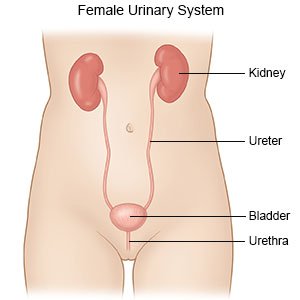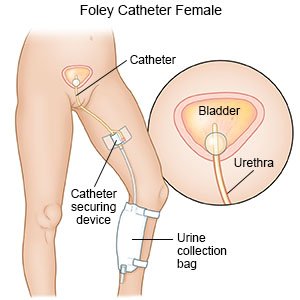Acute Urinary Retention in Women
Medically reviewed by Drugs.com. Last updated on Oct 29, 2024.
What is acute urinary retention (AUR)?
AUR means your bladder is full, but you cannot urinate. This condition happens suddenly, gets worse quickly, and lasts a short time.
 |
What causes AUR?
- Weak bladder muscle
- Blockages, such as a stone or growth
- Nerve damage from diabetes, stroke, or spinal cord injuries
- Swelling or infection, including childbirth, pelvic surgery, or a urinary tract infection
- Certain medicines, such as narcotics, anesthesia, and antidepressants
What are the signs and symptoms of AUR?
- Discomfort or pain in your lower abdomen
- A bloated lower abdomen
- Urge to urinate after you just went
- A urine stream that stops and starts on its own
How is AUR diagnosed?
Your healthcare provider will ask about your health history and the medicines you take. He or she will press or tap on your lower abdomen. You may need any of the following tests:
- A pelvic exam will be done to check for blockages. A pelvic exam will also show if your bladder, uterus, or other organs have moved out of place.
- A post void residual test will show how much urine is left in your bladder after you urinate. You will be asked to urinate. Then healthcare providers will use a small ultrasound machine to check how much urine is in your bladder.
- Urine tests may be needed to check for blood or infection.
- Blood tests may be needed to check for infection and kidney function.
How is AUR treated?
- A Foley catheter is a tube put into your bladder to drain urine into a bag. Keep the bag below your waist. This will prevent urine from flowing back into your bladder and causing an infection or other problems. Also, keep the tube free of kinks so the urine will drain properly. Do not pull on the catheter. This can cause pain and bleeding, and may cause the catheter to come out.

- Antibiotics help treat or prevent a bacterial infection.
Treatment options
The following list of medications are related to or used in the treatment of this condition.
Call your local emergency number (911 in the US) for any of the following:
- You are breathing faster than usual.
- Your heartbeat is faster than usual.
When should I seek immediate care?
- You have severe abdominal pain.
- Your face, hands, feet, or ankles are swollen.
When should I call my doctor?
- You have a fever.
- You have pain when you urinate.
- You see blood in your urine.
- You have problems with your catheter.
- You have questions or concerns about your condition or care.
Care Agreement
You have the right to help plan your care. Learn about your health condition and how it may be treated. Discuss treatment options with your healthcare providers to decide what care you want to receive. You always have the right to refuse treatment. The above information is an educational aid only. It is not intended as medical advice for individual conditions or treatments. Talk to your doctor, nurse or pharmacist before following any medical regimen to see if it is safe and effective for you.© Copyright Merative 2024 Information is for End User's use only and may not be sold, redistributed or otherwise used for commercial purposes.
Learn more about Acute Urinary Retention
Treatment options
Care guides
Further information
Always consult your healthcare provider to ensure the information displayed on this page applies to your personal circumstances.
